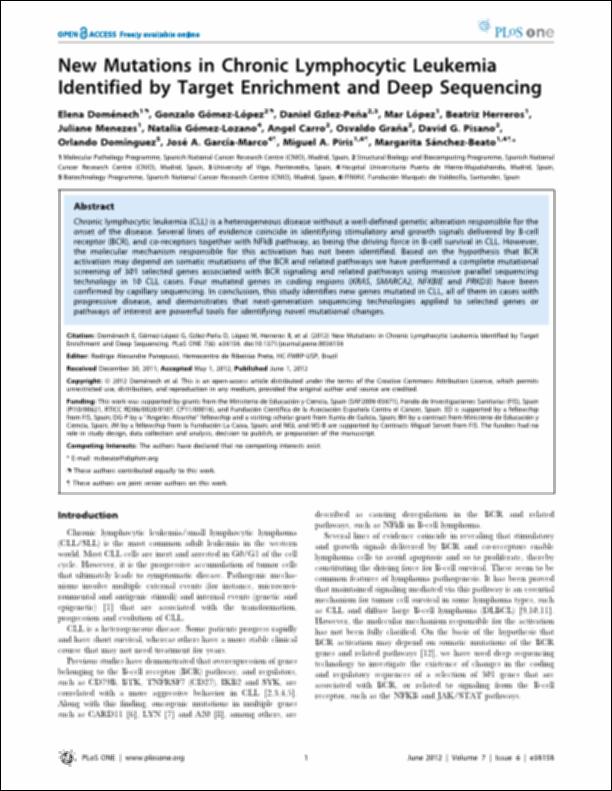Por favor, use este identificador para citar o enlazar este ítem:
http://hdl.handle.net/10637/15267New mutations in chronic lymphocytic leukemia identified by target enrichment and deep sequencing
| Título : | New mutations in chronic lymphocytic leukemia identified by target enrichment and deep sequencing |
| Autor : | Doménech, Elena Gómez-López, Gonzalo González Peña, Daniel López, Mar Herreros, Beatriz Menezes, Juliane Gómez Lozano, Natalia Carro, Ángel Graña, Osvaldo Pisano, David G. Domínguez, Orlando García-Marco, José A. Piris, Miguel Ángel Sánchez-Beato, Margarita |
| Materias: | DNA Mutational Analysis; High-Throughput Nucleotide Sequencing; Leukemia; Lymphocytic; Chronic; B-Cell; Mutant Proteins; Neoplasm Proteins |
| Editorial : | Public Library of Science |
| Citación : | Doménech E, Gómez-López G, Gzlez-Peña D, López M, Herreros B, Menezes J, Gómez-Lozano N, Carro A, Graña O, Pisano DG, Domínguez O, García-Marco JA, Piris MA, Sánchez-Beato M. New mutations in chronic lymphocytic leukemia identified by target enrichment and deep sequencing. PLoS One. 2012;7(6):e38158. doi: 10.1371/journal.pone.0038158. Epub 2012 Jun 1. PMID: 22675518; PMCID: PMC3365884 |
| Resumen : | Chronic lymphocytic leukemia (CLL) is a heterogeneous disease without a well-defined genetic alteration responsible for the onset of the disease. Several lines of evidence coincide in identifying stimulatory and growth signals delivered by B-cell receptor (BCR), and co-receptors together with NFkB pathway, as being the driving force in B-cell survival in CLL. However, the molecular mechanism responsible for this activation has not been identified. Based on the hypothesis that BCR activation may depend on somatic mutations of the BCR and related pathways we have performed a complete mutational screening of 301 selected genes associated with BCR signaling and related pathways using massive parallel sequencing technology in 10 CLL cases. Four mutated genes in coding regions (KRAS, SMARCA2, NFKBIE and PRKD3) have been confirmed by capillary sequencing. In conclusion, this study identifies new genes mutated in CLL, all of them in cases with progressive disease, and demonstrates that next-generation sequencing technologies applied to selected genes or pathways of interest are powerful tools for identifying novel mutational changes |
| URI : | http://hdl.handle.net/10637/15267 |
| Derechos: | http://creativecommons.org/licenses/by-nc-nd/4.0/deed.es OpenAccess |
| ISSN : | 1932-6203 |
| Fecha de publicación : | 1-jun-2012 |
| Centro : | Universidad San Pablo-CEU |
| Aparece en las colecciones: | Medicina |
Los ítems de DSpace están protegidos por copyright, con todos los derechos reservados, a menos que se indique lo contrario.


